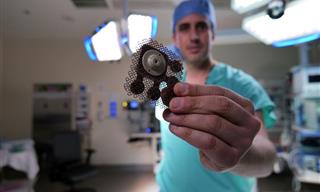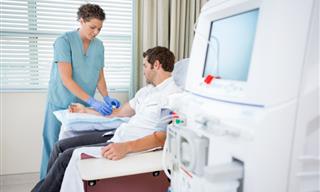There’s renewed hope that paraplegic and quadriplegic patients will one day be able to return motor and sensory function to their affected limbs, thanks to a brand-new invention by doctors in the US.
The stimulator they have come up with bypasses spinal injuries by forcing the body to use alternative neural pathways in order to transmit signals to the body’s extremities. In fact, the most recent test that the doctors conducted saw a quadriplegic’s finger motion improve by 300% while simultaneously improving grip strength, giving the patient the ability to perform everyday tasks once again.
Last June, the doctors implanted the stimulator into the body of a 28-year-old quadriplegic named Brian Gomez. The operation was conducted at Ronald Reagan University in California, USA. Gomez suffered his injuries during a dirt biking accident when he was 23 years old.
He broke his neck at his C-5 vertebra, which is at the middle of the neck next to the thyroid cartilage. This means that he lost all motor functions at his extremities, but retained head-to-toe sensation. Due to the nature of the injury he suffered, he was considered to be the perfect candidate for the experimental treatment.

Gomez assisted the researchers by giving them feedback on the sensations he was feeling from the stimulator so that they could be adjusted accordingly. The stimulator contains a series of 32 electrodes that can send pulses around the injured area, and that’s why it was implanted into the patient’s neck – to bypass the injury.
A great analogy for how the stimulator works is what occurs when there’s an accident on a freeway. While it’s almost inevitable that traffic will come to a standstill, there are numerous side streets and detours that can be taken to bypass the scene of the accident and reach the final destination.
Neural signals are like traveling vehicles, the scene of the accident is the injury, and the alternate routes are the new pathways that the stimulator helps the spinal cord to find.
In addition to the stimulator and its electrodes, the researchers also implanted a battery pack into the patient so that the electrical stimulation they were providing to him could be fine-tuned into certain patterns, thus providing more or less stimulation to certain areas as needed.

The concept behind this is to stimulate neural pathways that the brain might be ignoring. Over time, these pathways open up and allow messages to pass through them. In essence, the whole process is like retraining the body to use the undamaged “side streets” so that the neural messages can arrive, thus returning functionality to the body’s extremities.
This particular study marks the very first time that doctors have tried electrode technology on someone suffering from quadriplegia stemming from a neck injury. It’s also the first time that such technology has been implanted under the skin to attempt to treat such an injury.
Despite the excitement resulting from this genuine medical breakthrough, it must be emphasized that the researchers’ intention was never to return affected limbs back to 100% functionality. In fact, the main goal was for hands to be able to impart enough force in order for the patient to be able to do tasks such as brushing his teeth, tying his shoelaces, or simply eating food with a fork.
Although the breakthrough is undoubtedly fascinating, researchers are exercising caution with regard to expectations, and this is because the stimulator has only been tested on a single patient to date. More data needs to be gathered, followed by a peer review and publication of the researchers’ definitive results. Nevertheless, it’s a hugely exciting time for paraplegics and quadriplegics who now have hope of returning some motor function to their extremities.
Watch a video about the breakthrough here:
 Go to BabaMail
Go to BabaMail






















































